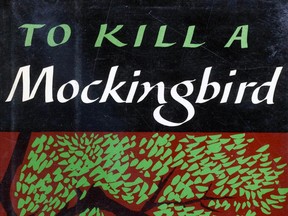
Article content
Re: Surrey schools pull To Kill a Mockingbird and other books from recommended reading curriculum
“We did a comprehensive review of these resources that determined that the merits of these novels do not outweigh the potential trauma and harm they may cause to some students.” This according to a spokesperson for the school district in Surrey in explaining why To Kill A Mockingbird and Of Mice And Men are among the books being removed from the recommended reading curriculum.
Advertisement 2
Article content
Article content
The benefits of reading these books are well-known by all educators involved in English language education. “Potential trauma” by its name and definition is unknown.
So how can an unknown issue outweigh a known benefit?
The Surrey school district is in deep trouble if this is representative of the thinking and analysis by its representatives.
Gordon Foy, Burnaby
I thought Alberta was the Florida of Canada. I guess that title belongs to Surrey and its educators. Now we’re banning classic literature from our schools in a misguided attempt to bubblewrap our children?
Cal Koat, Vancouver
Finally, the idiocy from the southern States has arrived in B.C. We, however, don’t “ban” books — we “remove” them. They missed one book that may be triggering to the Surrey School District: It tells the tale of a dystopian society where those in charge tell you how to feel, what to think and how to live: George Orwell’s 1984.
Don Stephen, Maple Ridge
We must demand a justice system that reflects our values of fairness
Re: ‘Always going to be that fear’: Robert Pickton victim’s relative decries day-parole chance
Article content
Advertisement 3
Article content
Last week, Robert Pickton, Canada’s most prolific serial killer, became eligible for parole. As we mark another painful milestone in the story of Vancouver’s missing women, we need to reflect on the continued pain and suffering of the victims and their families.
The wounds left behind by Pickton’s brutal murders run deep. For those who lost loved ones, these wounds will never completely heal.
It is particularly difficult for me to see this murderer come up for parole, because I worked on Vancouver’s Downtown Eastside, and knew many of the victims. Five years after Robert Pickton was arrested, I was a witness for the Crown and testified in a courtroom filled with grieving families. This is a memory I can never erase.
The Pickton trial began in January 2007 and concluded in December of the same year, making it one of Canada’s longest, most expensive trials in our history.
Prolific offenders such as Robert Pickton must stay in prison. For the families of Pickton’s victims, just mentioning his name induces a profound sense of loss, pain, and anger. Their lives were forever changed by his actions, and each parole hearing serves as a painful reminder of the horrors his victims endured.
Advertisement 4
Article content
We need to reassert the importance of victims in the criminal justice process and restore balance to our justice system. This means ensuring that victims are given a meaningful voice in legal proceedings and that they receive the support and resources they need to rebuild their lives. It also means holding offenders accountable for their actions by prioritizing public safety, sentencing and parole decisions.
As Canadians we must insist that our justice system reflects our values of fairness, accountability, and compassion. We need a justice system that places the victims first and ensures that justice is served for all. It’s time to re-balance the scales of justice and reaffirm our commitment to supporting victims of crime. Only then, can we truly build a safe and more just society for all Canadians.
Elaine Allan, Vancouver
Drivers need be more patient with pedestrians
I am writing as a frequent pedestrian, and a less-frequent driver. As a pedestrian, I have found myself on higher alert recently. It seems that car drivers perceive pedestrians as nuisances, and are ready to race through intersections. I am not a slow walker, so that is not part of the problem. I would certainly be extra challenged as a slow walker, due to the pressure from drivers. I do not trust crosswalks until I see drivers stop, and we acknowledge one another.
The actual solution is for drivers to get out of their cars and try walking. They might become more patient once they return to their cars.
Shirley Cohn, Burnaby
Letters to the editor should be sent to sunletters@vancouversun.com. Click here to report a typo.
Is there more to this story? We’d like to hear from you about this or any other stories you think we should know about. Email vantips@postmedia.com.
Article content



